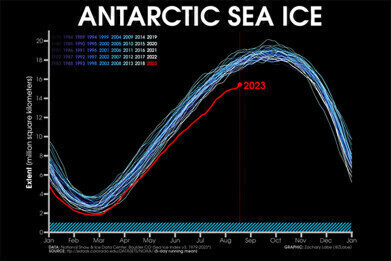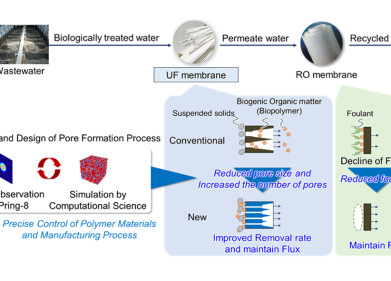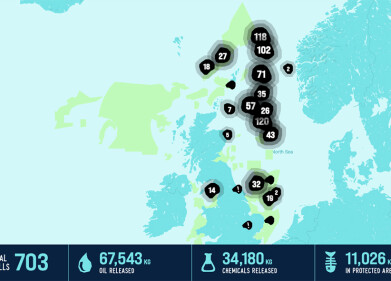Water/Wastewater
Catastrophic breeding failure strikes emperor penguins due to loss of sea ice
Aug 25 2023
The year 2022 witnessed a devastating blow to emperor penguin breeding colonies in a segment of Antarctica where the sea ice completely disappeared. This grim occurrence aligns with the predictions that over 90% of these majestic colonies could face quasi-extinction by the century's end, given the ongoing trajectory of global warming.
In a recent study published in the journal Nature Communications Earth & Environment, a team of researchers from the British Antarctic Survey shed light on the distressing likelihood that four out of the five renowned emperor penguin colonies in the central and eastern Bellingshausen Sea had most likely not produced any surviving chicks. Through meticulous analysis of satellite images, the scientists discerned the sea ice vanishing from the breeding locations long before the chicks could have developed their essential waterproof feathers.
The emperor penguins' fate is intrinsically tied to stable sea ice, particularly the "land-fast" ice that firmly attaches to the shoreline. This ice is a crucial support for the penguins throughout the majority of the year, spanning from April to January. These penguins typically lay their eggs during the harsh Antarctic winter months, between May and June. After an incubation period of 65 days, the eggs hatch, but the chicks remain in the nest until summer, which falls between December and January.
By the onset of December 2022, the extent of Antarctic sea ice had plummeted to match the previous all-time low recorded in 2021. The most severe ice loss occurred in the central and eastern Bellingshausen Sea region, located to the west of the Antarctic Peninsula, where the loss was complete, with no sea ice remaining by November 2022.
Dr. Peter Fretwell, the lead author of the study, conveyed his astonishment at the unprecedented scale of this failure, stating, "Never before have we witnessed such a widespread breeding failure among emperor penguins in a single season. The disappearance of sea ice during the Antarctic summer greatly diminished the chances of displaced chicks surviving. It's evident that emperor penguins are exceptionally vulnerable in the face of a warming climate, and prevailing scientific evidence indicates that these extreme sea ice loss events will become more frequent and widespread."
Since 2016, Antarctica has encountered its lowest sea ice extents over the past 45 years, with 2021/22 and 2022/23 marking the two lowest years in this record. Over the period from 2018 to 2022, 28 out of the 62 known emperor penguin colonies in Antarctica were impacted by partial or complete sea ice loss. While pinpointing specific extreme seasons as direct consequences of climate change may pose challenges, the long-term reduction in sea ice extent aligns with projections from current climate models.
The response of emperor penguins to prior instances of sea ice loss has involved relocating to more stable sites in the subsequent year. However, this adaptive strategy becomes ineffective when sea ice habitats across an entire region succumb to disruption. Unlike many species facing threats from hunting or habitat destruction, emperor penguins have primarily felt the impact of climate change as the primary driver of their population changes.
Efforts to predict the fate of emperor penguin populations have grimly outlined that if current warming rates persist, over 90% of colonies could face quasi-extinction by the close of this century. The five penguin colonies examined in this study—Rothschild Island, Verdi Inlet, Smyley Island, Bryan Peninsula, and Pfrogner Point—had been identified within the last 14 years using satellite imagery. All five colonies displayed fidelity to their breeding locations, with only one past instance of breeding failure noted at Bryan Peninsula in 2010.
In the current era, satellite imagery has become instrumental in identifying and monitoring emperor penguin colonies, with the birds' guano starkly standing out against the backdrop of ice and snow. The study's team relied on data from the European Commission's Copernicus Sentinel-2 satellite mission, which has continuously surveyed the Antarctic region since 2018.
The repercussions of Antarctic sea ice loss have been severe over the last seven years, with a noticeable decrease in ice coverage. By the conclusion of December 2022, the extent of sea ice had hit an unprecedented low in the 45-year satellite record. In the Bellingshausen Sea, the habitat of the penguin colonies in question, the reformation of sea ice didn't commence until late April 2023.
This departure from the norm has escalated, with sea ice extent as of August 20, 2023, plunging 2.2 million square kilometres below the 1981-2022 median (17.9 million square kilometres). This drastic reduction significantly surpassed the previous record winter low of 17.1 million square kilometres recorded on August 20, 2022. To put this missing ice area in perspective, it exceeds the size of Greenland or is roughly ten times the expanse of the United Kingdom.
Dr. Caroline Holmes, a polar climate scientist at the British Antarctic Survey, remarked on the persistently unprecedented state of Antarctic sea ice in August 2023, noting the remarkable absence of ice in a period when oceans should be freezing. The fluctuations in sea ice extent from year to year are closely tied to natural atmospheric phenomena such as El Niño-Southern Oscillation, the potency of the southern hemisphere jet stream, and regional low-pressure systems.
While it will require sustained targeted observations and modelling efforts to precisely discern the influence of these natural phenomena versus human-induced climate change, the recurrent years of plummeting sea ice records and the warming of the subsurface Southern Ocean strongly point to the exacerbation of extremes due to global warming.
Climate models echo the predictions of declining Antarctic sea ice under current and projected human carbon dioxide emissions. Dr. Jeremy Wilkinson, a sea ice physicist at the British Antarctic Survey, emphasized the glaring link between sea ice loss and the dire consequences for ecosystems. He underscored that climate change is rapidly eroding sea ice, with the Arctic likely to lose it entirely in the 2030s and the Antarctic witnessing the four lowest sea ice extents since 2016. In this context, it's a poignant warning to humanity that immediate action from policymakers is imperative to mitigate the impact of climate change—a course that no longer affords any delay.
Events
Apr 15 2025 Moscow, Russia
Apr 21 2025 Shanghai, China
May 11 2025 Vienna, Austria
May 18 2025 Algiers, Algeria
23rd International Water Management Exhibition
May 20 2025 Prague, Czech Republic



















